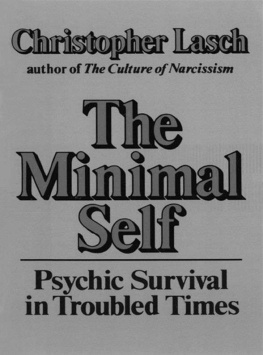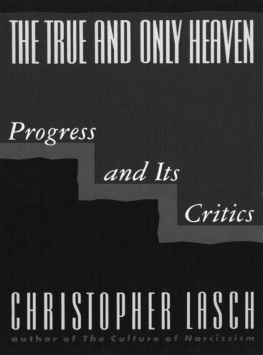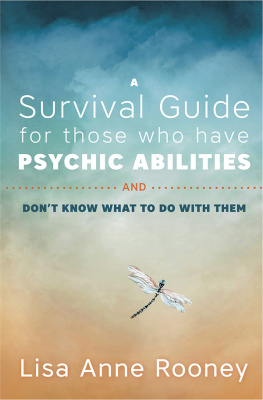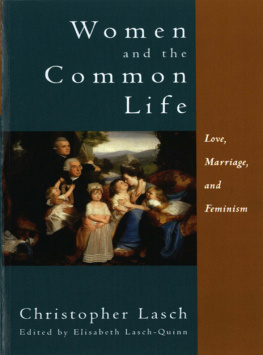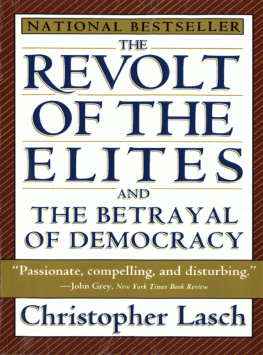Christopher Lasch - The Minimal Self: Psychic Survival in Troubled Times
Here you can read online Christopher Lasch - The Minimal Self: Psychic Survival in Troubled Times full text of the book (entire story) in english for free. Download pdf and epub, get meaning, cover and reviews about this ebook. year: 1985, publisher: W. W. Norton, genre: Politics. Description of the work, (preface) as well as reviews are available. Best literature library LitArk.com created for fans of good reading and offers a wide selection of genres:
Romance novel
Science fiction
Adventure
Detective
Science
History
Home and family
Prose
Art
Politics
Computer
Non-fiction
Religion
Business
Children
Humor
Choose a favorite category and find really read worthwhile books. Enjoy immersion in the world of imagination, feel the emotions of the characters or learn something new for yourself, make an fascinating discovery.
- Book:The Minimal Self: Psychic Survival in Troubled Times
- Author:
- Publisher:W. W. Norton
- Genre:
- Year:1985
- Rating:3 / 5
- Favourites:Add to favourites
- Your mark:
- 60
- 1
- 2
- 3
- 4
- 5
The Minimal Self: Psychic Survival in Troubled Times: summary, description and annotation
We offer to read an annotation, description, summary or preface (depends on what the author of the book "The Minimal Self: Psychic Survival in Troubled Times" wrote himself). If you haven't found the necessary information about the book — write in the comments, we will try to find it.
Even more valuable than its widely praised predecessor, The Culture of Narcissism. John W. Aldridge
Faced with an escalating arms race, rising crime and terrorism, environmental deterioration, and long-term economic decline, people have retreated from commitments that presuppose a secure and orderly world. In his latest book, Christopher Lasch, the renowned historian and social critic, powerfully argues that self-concern, so characteristic of our time, has become a search for psychic survival.The Minimal Self: Psychic Survival in Troubled Times — read online for free the complete book (whole text) full work
Below is the text of the book, divided by pages. System saving the place of the last page read, allows you to conveniently read the book "The Minimal Self: Psychic Survival in Troubled Times" online for free, without having to search again every time where you left off. Put a bookmark, and you can go to the page where you finished reading at any time.
Font size:
Interval:
Bookmark:
OTHER BOOKS BY CHRISTOPHER LASCH
The American Liberals and the Russian Revolution (1962)
The New Radicalism in America (1965)
The Agony of the American Left (1969)
The World of Nations (1973)
Haven in a Heartless World: The Family Besieged (1977)
The Culture of Narcissism (1979)
The True and Only Heaven: Progress and Its Critics (1991)
The Minimal Self
WWNorton & Company |
To Chris
He is as full of valor as of kindness, Princely in both.
Henry V, IV. iii
The entire modern deification of survival per se, survival returning to itself, survival naked and abstract, with the denial of any substantive excellence in what survives, except the capacity for more survival still, is surely the strangest intellectual stopping-place ever proposed by one man to another.
William James
IN a time of troubles, everyday life becomes an exercise in survival. People take one day at a time. They seldom look back, lest they succumb to a debilitating nostalgia; and if they look ahead, it is to see how they can insure themselves against the disasters almost everybody now expects. Under these conditions, selfhood becomes a kind of luxury, out of place in an age of impending austerity. Selfhood implies a personal history, friends, family, a sense of place. Under siege, the self contracts to a defensive core, armed against adversity. Emotional equilibrium demands a minimal self, not the imperial self of yesteryear.
Such is the thesis, in its simplest form, advanced in these pages, in which the reader will find, accordingly, no indignant outcry against contemporary hedonism, self-seeking, egoism, indifference to the general goodthe traits commonly associated with narcissism. In this essay, I hope first of all to make clear what The Culture of Narcissism seems to have left obscure or ambiguous: that the concern with the self, which seems so characteristic of our time, takes the form of a concern with its psychic survival. People have lost confidence in the future. Faced with an escalating arms race, an increase in crime and terrorism, environmental deterioration, and the prospect of long-term economic decline, they have begun to prepare for the worst, sometimes by building fallout shelters and laying in provisions, more commonly by executing a kind of emotional retreat from the long-term commitments that presuppose a stable, secure, and orderly world. Ever since the Second World War, the end of the world has loomed as a hypothetical possibility, but the sense of danger has greatly increased in the last twenty years, not only because social and economic conditions have grown objectively more unstable but because the hope of a remedial politics, a self-reformation of the political system, has sharply declined. The hope that political action will gradually humanize industrial society has given way to a determination to survive the general wreckage or, more modestly, to hold ones own life together in the face of mounting pressures. The danger of personal disintegration encourages a sense of selfhood neither imperial nor narcissistic but simply beleaguered.
Even opposition movementsthe peace movement, the environmental movementtake survival as their slogan. Of course they refer to the survival of humanity as a whole, not to the everyday psychic survival of individuals; but they still reflect and reinforce a survival mentality. They call for a moral commitment to survival (as Richard Falk puts it in his ecological manifesto, This Endangered Planet), oblivious to the danger that a commitment to survival, instead of leading to constructive political action, can just as easily lead to a mountain hideaway or to national policies designed to enable the country to survive a nuclear war. The peace movement and the environmental movement call attention to our societys criminal indifference to the needs of future generations, but they inadvertently reaffirm this attitude by dwelling, for example, on the dangers of overpopulation and the irresponsibility of bringing children into an already overcrowded world. Too often they substitute an abstract interest in the future for the kind of palpable, emotional interest that enables people to make sacrifices on its behalf. In the same way, emphasis on the global dimensions of the survival issueon the need for global controls and for the development of a global mindprobably helps to undermine attachments to a particular place and thus to weaken still further the emotional basis on which any real interest in the future has to rest. Rootless men and women take no more interest in the future than they take in the past; but instead of reminding us of the need for roots, many advocates of disarmament and environmental conservation, understandably eager to associate their cause with the survival of the planet as a whole, deplore the local associations and attachments that impede the development of a planetary consciousness but also make it possible for people to think constructively about the future instead of lapsing into cosmic panic and futuristic desperation.
In the nuclear age, survival has become an issue of overriding importance; but the attempt to awaken the public to its collective implications often tends to strengthen the inertia it seeks to overcome. The great danger of an apocalyptic argument, as Falk himself recognizes, is that to the extent it persuades, it also immobilizes. Heedless of his own warning, he insists that unless the worlds leaders create a new world order, there is little hope that our children will avoid the apocalypse.
Do not mistake me: the growing opposition to the nuclear arms race, the growing awareness of ecology, the growing criticism of consumerism and high technology, criticism of the masculine psychology of conquest and competitive enterprise hold out the best hope for the future. By dramatizing the dangers ahead, opposition movements inadvertently strengthen the siege mentality, but they also provide the only effective antidote against it: a determination to mount a collaborative assault on the difficulties that threaten to overwhelm us. Political action remains the only effective defense against disasterpolitical action, that is, that incorporates our new understanding of the dangers of unlimited economic growth, unlimited technological development, and the unlimited exploitation of nature. Whether it tells us much about the psychological roots of the Promethean will-to-power to call it a purely masculine obsession, which can be countered by the feminine qualities of cooperation and loving care, is an important question on which I hope to shed some light; but it is a good idea to remind ourselves at the outset that militarism and runaway technology have social, economic, and political roots as well as psychological roots and that political opposition to these evils, even if it often rests on shaky psychological and philosophical premises, represents an indispensable beginning in the struggle to make our world fit for human habitation.
Recent controversies about the contemporary culture of narcissism have revealed two quite different sources of confusion. The first, alluded to already and examined in some detail in the first of the following chapters, is the confusion of narcissism with egoism and selfishness. An analysis of the siege mentality and the strategies of psychic survival it encourages (the subject of chapters II, III, and IV) will serve not only to identify characteristic features of our cultureour protective irony and emotional disengagement, our reluctance to make long-term emotional commitments, our sense of powerlessness and victimization, our fascination with extreme situations and with the possibility of applying their lessons to everyday life, our perception of large-scale organizations as systems of total controlbut also to distinguish narcissism from ordinary self-seeking. It will show how the prevailing social conditions, especially the fantastic mass-produced images that shape our perceptions of the world, not only encourage a defensive contraction of the self but blur the boundaries between the self and its surroundings. As the Greek legend reminds us, it is this confusion of the self and the not-selfnot egoismthat distinguishes the plight of Narcissus. The minimal or narcissistic self is, above all, a self uncertain of its own outlines, longing either to remake the world in its own image or to merge into its environment in blissful union. The current concern with identity registers some of this difficulty in defining the boundaries of selfhood. So does the minimalist style in contemporary art and literature, which derives much of its subject matter from popular culture, in particular from the invasion of experience by images, and thus helps us to see that minimal selfhood is not just a defensive response to danger but arises out of a more fundamental social transformation: the replacement of a reliable world of durable objects by a world of flickering images that make it harder and harder to distinguish reality from fantasy.
Next pageFont size:
Interval:
Bookmark:
Similar books «The Minimal Self: Psychic Survival in Troubled Times»
Look at similar books to The Minimal Self: Psychic Survival in Troubled Times. We have selected literature similar in name and meaning in the hope of providing readers with more options to find new, interesting, not yet read works.
Discussion, reviews of the book The Minimal Self: Psychic Survival in Troubled Times and just readers' own opinions. Leave your comments, write what you think about the work, its meaning or the main characters. Specify what exactly you liked and what you didn't like, and why you think so.

